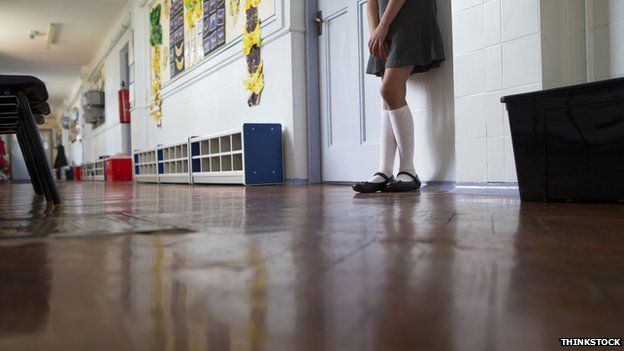Rise in number of primary pupils suspended
- Published

There was a rise in the number of children suspended from primary schools in England in the last academic year.
Fixed-term exclusions rose to 45,010 in 2013-14 from 37,870 the previous year. Government statisticians described this rise as "considerable".
They said it was driven by more assaults against pupils and adults, and more persistent disruptive behaviour.
Schools Minister Nick Gibb said heads now had greater clarity over exclusions and this was improving behaviour.
He added: "Today's figures show a slight increase in the number of fixed-period and permanent exclusions, although overall, they are lower than in 2010.
"Now we are going further by appointing behaviour expert Tom Bennett to lead a review group to ensure teachers are fully trained in dealing with disruptive children."
Physical assault
The number of primary pupils suspended, or given fixed-term exclusions for up to a period of 45 days, for assaulting an adult in school has risen by around a quarter.
Pupils aged five to 11 were suspended 11,420 times for physical assault against an adult in state-funded primary schools in 2013-14 - up from 9,080 the previous year.
The total number of permanent exclusions across primary, secondary and special schools also increased slightly compared with 2012-13, despite a general decline since 2004-05.
The figures from the Department for Education also revealed a 10% rise in suspension for assault against adults for pupils aged five to 16. Suspension for racist abuse in primary schools increased by 15.6%.
General secretary of the NASUWT teaching union Chris Keates said the increase in the number of pupils suspended due to assaulting adults in schools is extremely worrying.
"These figures underline the findings of a recent NASUWT survey in which 16% of teachers said they had been physically assaulted in the last 12 months by a pupil, an increase of 7% on the same survey in 2014.
"The increase in suspensions shows that, quite rightly, schools are not accepting violence against staff. However, there needs to be deeper analysis of why levels of violence are increasing."
Russell Hobby, general secretary of the National Association of Head Teachers, said: "An increase in the number of fixed-period exclusions in primary schools, with exclusion rates at their highest since 2007-08 shows the day-to-day challenges school leaders face.
"It's a challenging time for families who use and need public services facing cuts. This sometimes manifests as behaviour problems at younger ages than we might expect. Heads have a duty to protect the education of all children in their school and exclusions are a necessary tool in that duty."
Kevin Courtney, deputy general secretary of the National Union of Teachers, said: "Schools ability to manage particularly difficult cases has been adversely affected by cuts to local authority budgets, in particular Behaviour Support Services, and the fragmentation of the school system into academy and free schools."
- Published30 July 2015